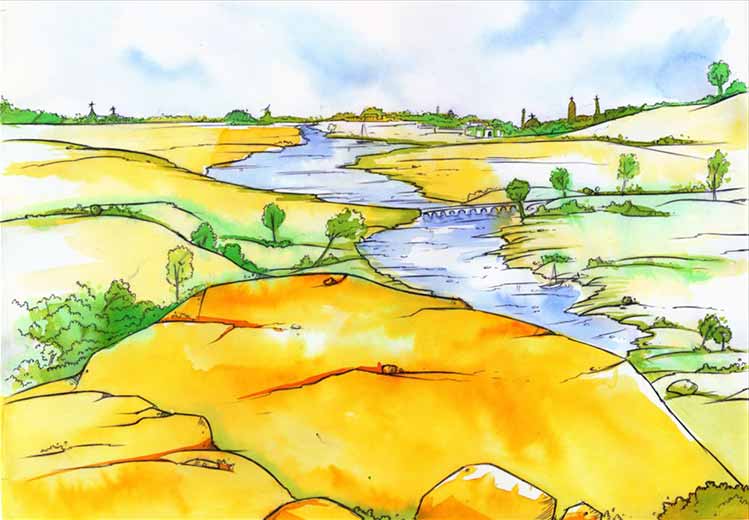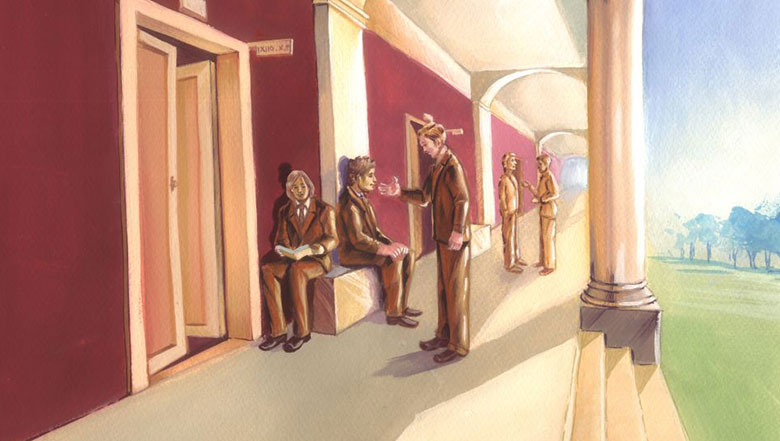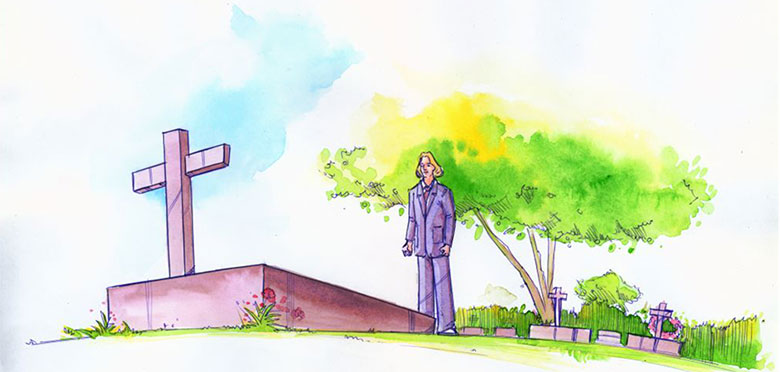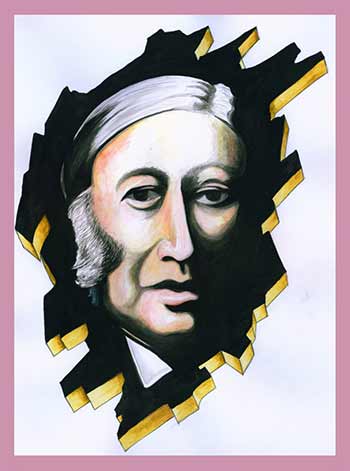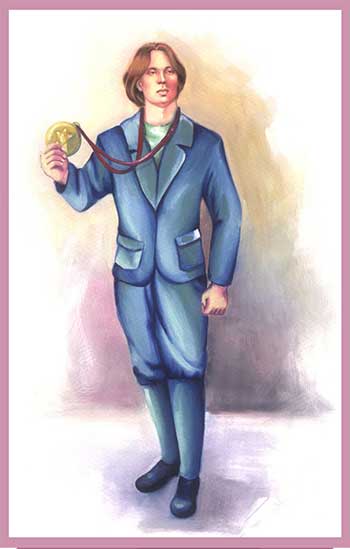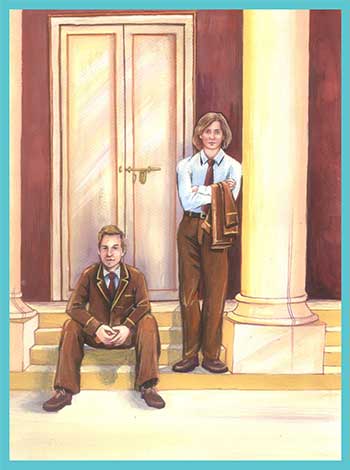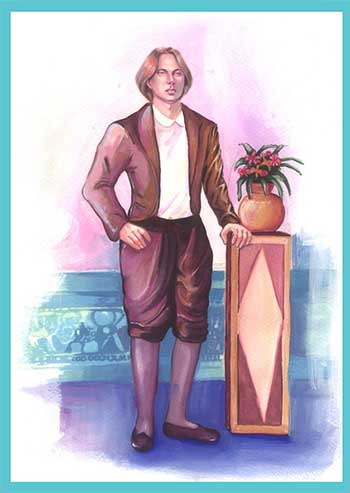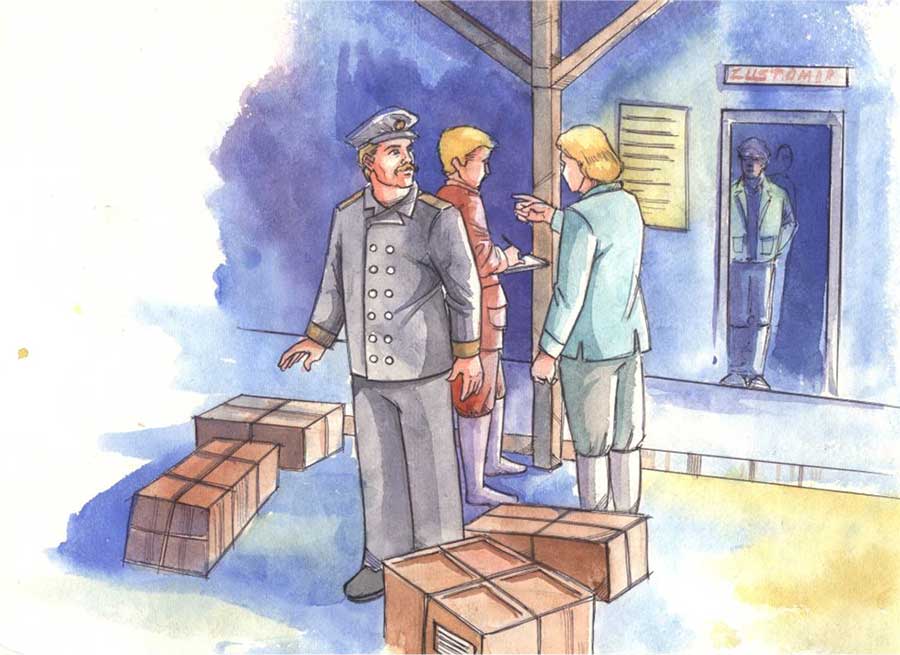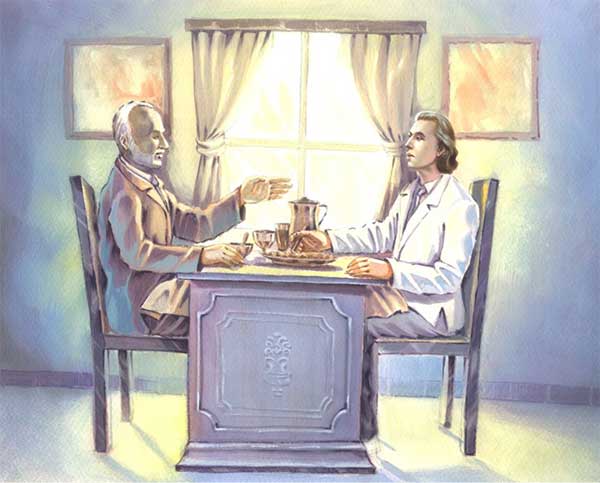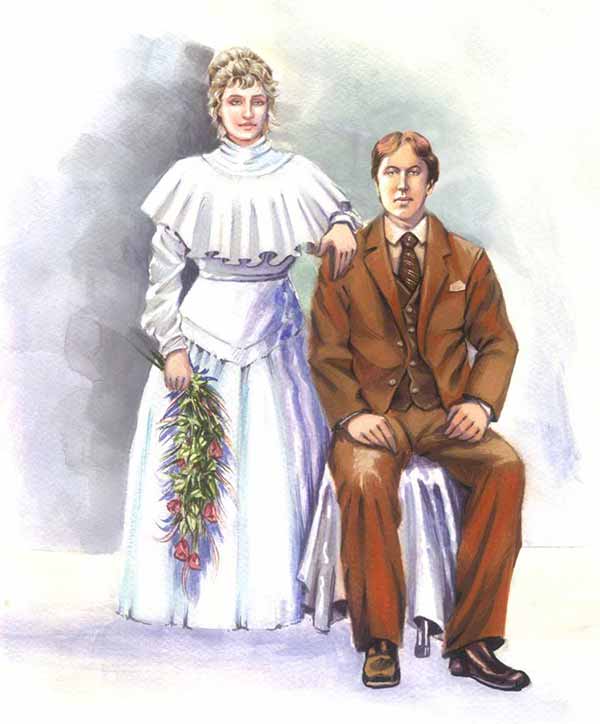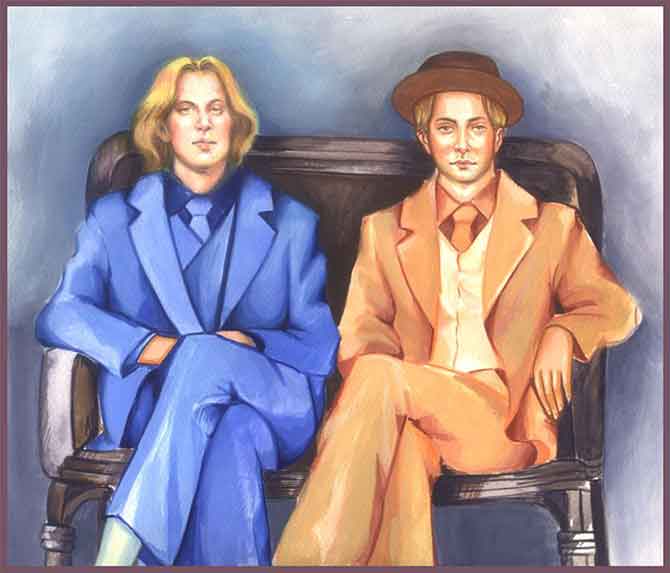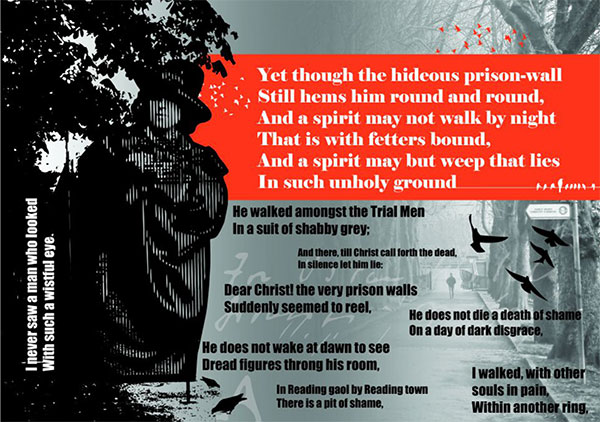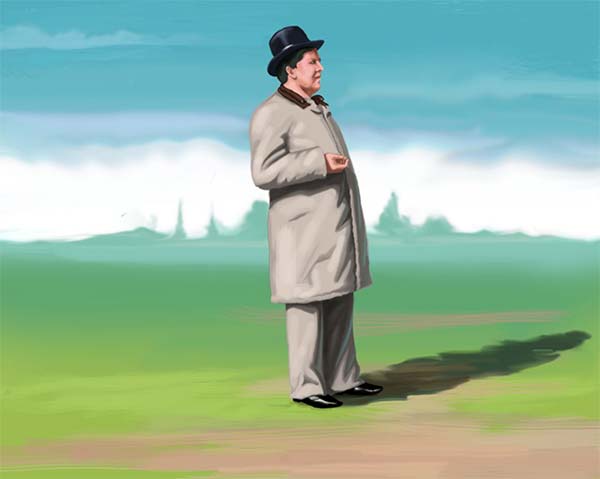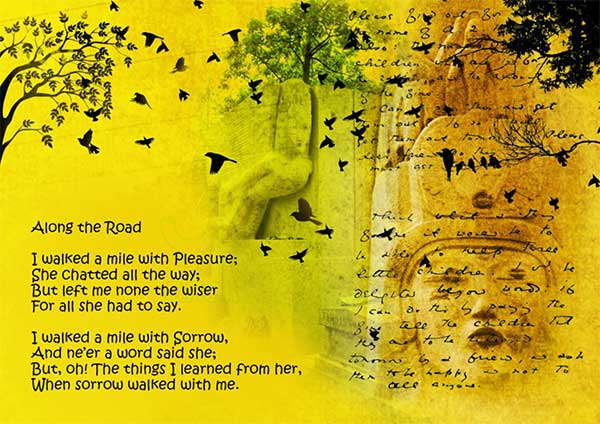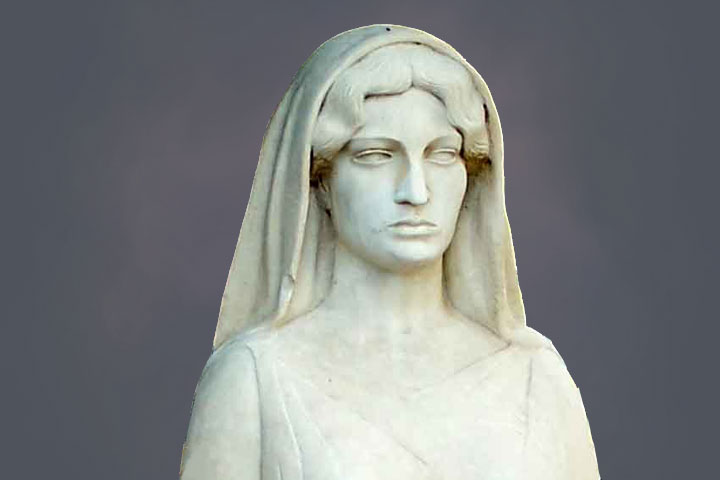

Introduction
“The more one analyses people, the more reasons for analysis disappear. Sooner or later one comes to that dreadful universal thing called human nature.”
–Oscar Wilde
The quote may have faint resemblance to a disclaimer, but holds strong relevance to our attempt to learn about one of the great lives that has contributed to humanity. Coming back to the quote, well, those were the words of Oscar Wilde and we chose to open with this quote for the purpose to abide by its words. We are not here to analyse anyone and we believe in the universality of human nature. After all, we are all the ‘SAME’ yet ‘DIFFERENT.’
To begin with, let us travel back in time: Ireland mid – 1845…
In Ireland, between 1845 and 1852, there was a period of mass starvation, disease and emigration. It was called ‘Gorta Mór’, the Irish name for the ‘Great Famine’. It was the time when many Irish nationals emigrated to USA and parts of Europe. This period was also called ‘Drochshaol’, the Irish word for bad times. But as they say, like good times, bad times do not last forever and there is sunshine after the rain.
Come 16th October, 1854, and sunshine named Oscar Fingal O’Flahertie Wills Wilde was born to Jane Francesca Elgee and William Robert Wills Wilde, at Westland Row. Did you notice it takes six seconds to say the complete name of Oscar Wilde? Well, until the mid-17th century, there was no practice of having a middle name. Gradually, with the passage of time, the mid-18th century saw this trend among the aristocratics and the wealthy. The English-speaking upper class families began giving middle name to their newborns and over a period of time, some families fancied having more than one. The advantages of having a middle name were to make your lineage known and to distinguish people with similar names.
Oscar Wilde was christened by his uncle, his father’s brother, Reverend Ralph Wilde, on 26th April, 1855 in St. Mark’s Church. In accordance with the words of the character Lord Henry Wotton, in Oscar’s novel ‘The Pictures of Dorian Gray’, “names are everything”, the poet mother and doctor father of Oscar Wilde made sure that the names of their children were given utmost substance of reason. In case of Oscar Wilde, he had three middle names – Fingal, O’Flahertie and Wills. The three middle names had a good reason to follow the first name – Oscar and to stop before his last name – Wilde. Fingal was an Irish legend, and O’Flahertie was added out of respect to his father William Wilde’s genealogical connections with the Galwegian family. It goes something like this: apparently, O Flaithbherartaigh was the most popular name among Galway families and was also the name of the pre-Norman kings of West Connacht. The Galway Burgesses had a famous prayer that went, “From the wild O’Flaherties good Lord deliver us!” Wills, the third middle name was taken from the family name of the playwright W.G. Wills.
The interesting part is the way Oscar Wilde signed his name. One of Oscar’s fellow students at Oxford recalls Oscar’s signature to be “O.O’F. Wills Wilde”. While in Trinity College, Oscar Wilde initialled himself as “O.F.O.F.W.W”.
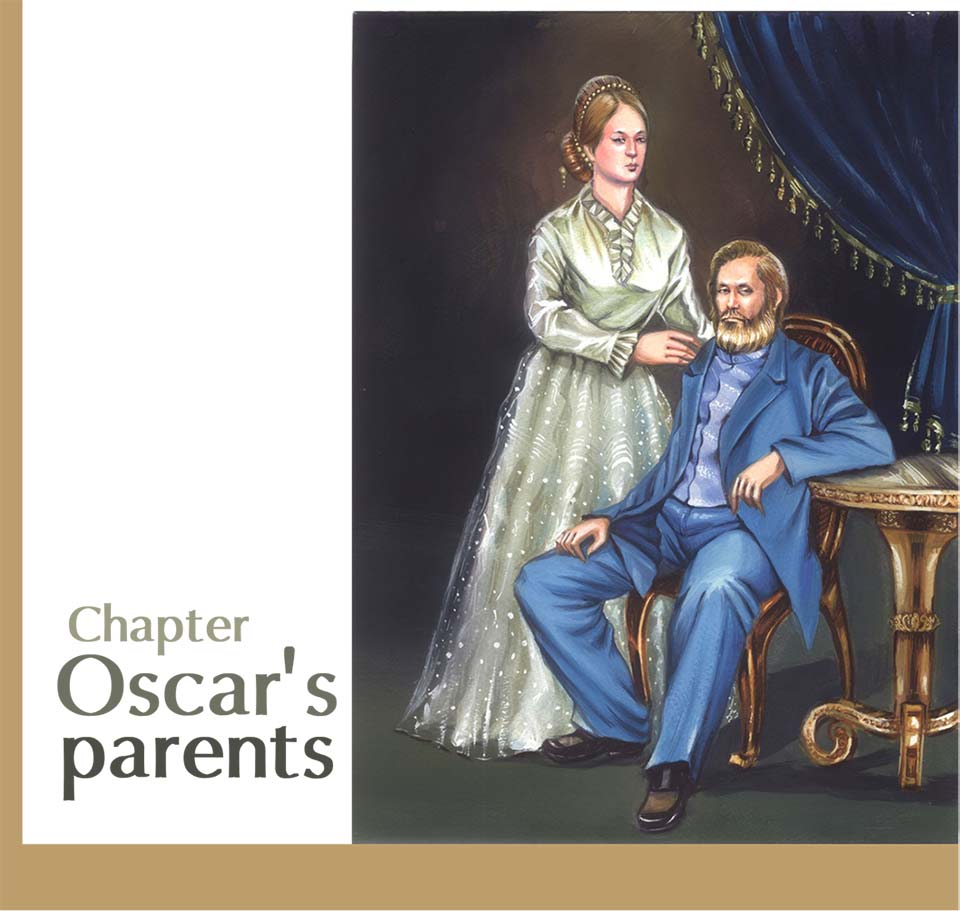
Chapter Oscar's Parents
The poet mama of Oscar Wilde – Jane Francesca Wilde was generally known as Lady Wilde. Born on 27th December, 1821, Jane grew up to be a poet and a supporter of Irish nationalist movement. She was the youngest of the four children of Charles Elgee and Sarah Elgee. Her father was a solicitor from Wexford and her great-grandfather was an Italian who immigrated to Wexford in the 18th century.
Young Jane was brought up in a strictly Protestant and conservative setting. Her parents had no interest in national aspirations. It was only until Miss Jane Elgee was eighteen that she read the ‘The Nation’ and got absorbed by the spirit of nationalism prevalent in the newspaper. Under the pen name ‘Speranza’ which means Hope, she wrote some inflammatory political poems and letters that were published in ‘The Nation’. She was an active member of Young Ireland movement and so her works were pro-Irish and anti-British. She not only wrote some of the rousing patriotic verse, but also revolutionary prose. ‘Jacta Alea Est’ (The Die is Cast) is a fine example of such prose. Its printing on the 29th of July, 1848, was suppressed and it was said to have provoked an armed revolt.
Apart from verse and prose in English, Lady Wilde also had a line of published translations from French, German, Spanish, Danish, Russian, Portuguese, Turkish and Swedish writers, both in prose and poetry. In November 1851, she married Sir William Wilde and made a family giving birth to three kids, first a son, William Robert Kingsbury Wills Wilde, second, another son Oscar Fingal O’Flahertie Wills Wilde and third, a daughter, Isola Francesca Emily Wilde.
After her first baby boy, she would have preferred a baby girl to Oscar. Taking this preference seriously she raised him as a girl until the age of seven. You can see pictures of little Oscar dressed as a girl. As a couple, the nearly six feet tall Lady Wilde and the average heighted Sir William Wilde made quite an uncommon pair in those times. She would hold a literary salon on Saturdays at her homes and had all social, literary and artistic celebrities visit her. Some of the visitors included Sheridan le Fanu(an Irish writer of Gothic tales and mystery novels), George Petrie(Irish artist, archaeologist and antiquarian), Samuel Lever, Isaac Butt (regarded as the founder of the Home Rule Movement in Ireland) and Samuel Ferguson (an Irish poet, barrister, antiquarian, artist and public servant). Lady Wilde regularly wrote to her friends about her family and work, about which we will learn during the course of Oscar’s biography.
The doctor papa – William Robert Wilde, born in March 1815 in a middle-class family, was the son of a physician, grandson of a farmer and great grandson of a Dublin merchant. At the time of his birth, the family lived in County Roscommon, at Kilkeevin near Castlerea. He was the youngest of the two sons and three daughters of Thomas and Amelia Wilde. Two of their sons became priests of ‘Church of Ireland’ while William chose to follow his father’s profession. William received his initial education at the Elphin Diocesan School in Elphin. He was seventeen years old when he joined the pre-eminent Irish surgeon of the day, Dr Abraham Colles as an apprentice at Dr Steeven’s Hospital, Dublin. He studied at the private and highly respected School of Anatomy, Medicine and Surgery. After five years of studies in Medicine, in 1837, William earned his medical degree and much after that he ran his own eye and ear hospital, the ‘St. Mark’s Opthalmic Hospital’ in Dublin.
Besides writing books on eye surgery, he is known to have written The Beauties of the Boyne in 1849. The book received laudatory review in The Nation, any guesses as to who reviewed this book? Well, it was none other than Speranza. Yes, by Ms Jane Elgee! It is said that probably they hit it off from here. Before his marriage to Jane Elgee, William had fathered three children, one boy and two girls, with different parentage. He was twenty-three when his first illegitimate child, a boy was born. William named him Henry Wilson, the boy was followed by two girls, Emily in 1847 and Mary in 1849, from different parentage. As the girls were adopted by Sir William’s eldest brother Rev. Ralph Wilde, they bore the surname Wilde.
Later, in the career of Sir Wilde, his son Henry Wilson assisted him in his practice. Henry had been trained in Dublin, Vienna, Heidelberg, Berlin and Paris. Apparently, not much could be said about Emily and Mary. Prior to a party, in course of flaunting their ball room dresses one of the girls went too close to open fire. In the rescue process, both the sisters were engulfed by the flames. The tombstone of these girls dated 18th November, 1871, also bore the name of Isola, the legitimate daughter of Sir Wilde engraved on it, who had died four years before them.
Some of William’s achievements include, being appointed as the Surgeon Oculist to the Queen of Ireland in 1863 and being conferred the Knighthood at the Dublin Castle in the following year. He also wrote medical books such as Epidemic Ophthalmia (1851) and Aural Surgery (1853).
The eye and ear doctor had trained his eye on Irish archaeological remains and his ear on folklore. He catalogued the great collection of antiquities so adeptly that it found a place in the National Museum of Ireland. As far as his ear for folklore was concerned, he would collect superstitions, legends, cures and charms from his peasant patients. In fact, he would not charge them but instead, learn about a new folklore. He also amassed medical data for his books on Austria and Mediterranean coast. As a result, when the census of Ireland was to be undertaken, the census commissioner appointed William Wilde to organise the collection of medical information. William Wilde was one of the credible names in the circle of medicine. King Karl XV of Sweden conferred on him the title Nordstjärneorden (Order of the North Star). There are medical terms named after Sir William Wilde like: Wilde’s incision, Wilde’s cone of light and Wilde’s cords, used in the world of medicine.
Did you know?
William Wilde performed an eye surgery on the father of the famous Irish playwright George Bernard Shaw.
Lady Wilde was conversant with her husband’s past. Past about William’s illegitimate children, but then who does not have a past! It was said that Lady Wilde, before marriage, had a fascination for Isaac Butt. In one of her writings she called him, ‘the Mirabeau of Young Ireland movement.’ It is said, that in her 60s she quoted these words to a young man, “When you are as old as I, young man, you will know there is only one thing in the world worth living for, and that is sin.”
Talking about sin, a long time patient of Lady Wilde’s husband, Mary Travers, had alleged that Sir William dosed her with chloroform and then raped her. Mary Travers produced the letters which Sir William had written to her and won a favourable verdict.
This was about Oscar’s papa and mama. We now begin with the chapter Oscar in the biographical book of Oscar Wilde.
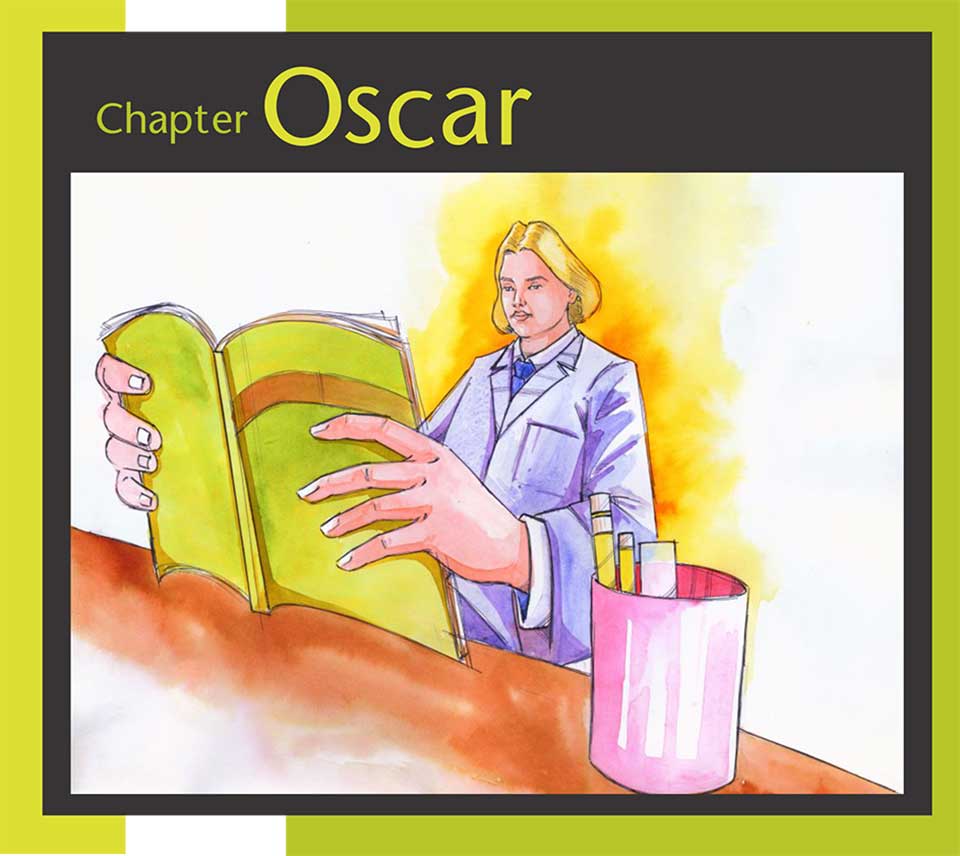
Chapter Oscar
After a few months of Oscar’s birth in October 1854, at 21 Westland Row, the Wildes moved into a new house – No. 1, Merrion Square in 1855. The new home was larger and spacious enough to become a hangout for the Wilde couples’ medicine and artist friends on Saturday. Little Oscar was two years old when he and his brother were blessed with a sister. Their mother would read to them the Young Irelanders’ poetry, to inculcate in them a love ‘OF’ these poets.
Till the age of nine Oscar received the traditional education, the home schooling. He had a French bonne and a German governess who taught him their languages. The Wilde siblings were having an affluent upbringing. The boys would never disobey their mom, but would scarcely obey the governess. In May 1863, Willie was put in a school near Dublin and very soon Oscar was to join his brother.
Everything was hunky-dory until the year 1864. This year turned out to be the year of high-and-low for the Wilde family. Their father, William Wilde, was conferred the knighthood at the Dublin Castle, and out of love and respect, the kids would address their dad as Sir Wilde. The boys were approaching their adolescence and Isola was turning seven. All was well and then the family was hit by the Mary Traver crisis that disturbed the peace of the house. The ‘Traver’ case kept Lady Wilde busy for most of the time so she decided to send the boys to a boarding school. Another reason for doing that was: she did not want her boys to go through the unpleasant situation that the family was going through. Thus, in February 1864, both the boys were sent to the Portora Royal School in Enniskillen.

Chapter Portora
A railway line started from Dublin to Enniskillen five years back, made it easier and possible for the boys to travel and attend school. The school located in County Fermanagh was initially a boarding school for boys and it was only in the 20th century that girls too were admitted. Among some of the Portorans who made the school proud are James Gamble, founder of Proctor and Gamble and Samuel Beckett, Irish avant-garde novelist, playwright and poet.
The older Wilde, Willie was into school activities big time. He became a popular ‘character’ as he was boastful and because of this boastfulness he would be ridiculed. He was good in drawing and his head master Rev. William Steele thought he was a talented boy. He would amusingly suggest to Oscar, “why don’t you follow your brother’s footstep.” Not only the headmaster, but Oscar’s mother too was full of praise for Willie. In one of her letters, she writes, “Willie is my kingdom.” However, this perception changed with time, when Willie was in his last year and was outdone by his brother. In Classics, where Willie stood thirteenth, Oscar came fourth. Talking about her boys in her letter to a friend, she wrote, “Willie is right, but for Oscar, he will turn out something wonderful.”
In school if Willie was energetic, Oscar was just the opposite, he was big and dreamy. William could play the piano, Oscar had no musical talent but they both were good raconteurs. Another interesting thing about Oscar was that he was good at keeping nick names for his fellow mates. However, he was not happy with his own nickname ‘Grey Crow.’ Oscar had an amazing gift of reading fast. He would bet with his friends to read a three-volume novel in half an hour and would easily win it. Oscar would not only read it in the stipulated time, he would also give an accurate narration of the plot of the story. And in a one hour reading, he would easily give you a fair narrative of the incidental scenes along with dialogues. If you thought that was all, then you need to hear this: he would read facing pages of a book at one time and in demonstration he showed how he had mastered the intricacies of a novel in three minutes.
His studious classmates assumed that he was a skimmer rather than a scholar. Only time proved them wrong. In 1866, Oscar was a prizeman in Junior School; this meant that he did not need to appear for the annual exams if he chose to. In 1869, he won a copy of Butler’s Analogy as the third prize for Scriptures. It is said that Oscar Wilde became OSCAR WILDE due to his sheer excitement over literary qualities of Greek and Latin texts and his sense to skip over insignificant text. His interest and passion in Greek culture won him the Carpenter prize for Greek Testament in 1870.
On one hand, the Wilde siblings were busy schooling, and on the other hand, daddy and mummy were busy studying. Daddy William published an ethnographic lecture on Ireland Past and Present in 1864, and also revised in 1872 Lough Corrib which was written by him in 1867. Mummy Wilde published her first collection of poem in 1864 titled Poems, which was followed by Poems: Second Series: Translations (1867). In 1871, these two books were combined together and published.
While the Wilde boys were occupied with schooling and mama and papa were busy getting their works published, the littlest Wilde – Isola was the only kid staying back home. The nine year old was down with fever in February 1867. The moment she felt a little better, she was sent to her uncle’s place at Mastrim (Edgworthtown) for change of air. But instead of feeling any better, things got bad and Isola suffered a fatal relapse and sporadic effusion on the brain. The loss of Isola was something that touched every member of the Wilde family. It was like the little princess seemed to have gone to a far far away land. Oscar, like other members of the family was equally bereaved and would visit her grave regularly. Not all tears are wet, nor all tears are salty. In the poem “Requiescat” the obvious imagery that comes to your mind is that it seems as if Oscar wrote the poem sitting beside her grave.
In Portora, Oscar would dress up in expensive fashionable clothes and was very interested in his own appearance. He also made his inclination to Hellenism conspicuous. Hellenism? Well it is about Greeks, their art, history, culture and civilization.
Considering that Oscar was a great playwright and a proponent of aestheticism, it is important that we understand the literary movement of that time. Some of the movements that interested Wilde were classicalism, neo-classicalism and aestheticism. Classicalism was one of Oscar Wilde’s prominent interests in his Portora school days. Classicalism, according to the Oxford Dictionary of Literary terms, is an attitude to literature that is guided by admiration of the qualities of formal balance, proportion, decorum and restraints attributed to the major works of ancient Greek and Roman literature. The adjective, classical, is usually applied to the work of writers whose works are unsurpassable models of excellence. The work of art in the classical phase was simpler, regular and did not show strong emotions.
A classical style or approach to literary composition is usually the one that imitates Greek or Roman models in subject matter or form. It was in the mid 17th and 18th century that the classicalism movement was much active. By 18th century, Neoclassicism came to be more synonymously known among the English writers.
During his last two years at Portora from 1869-71, Oscar began to make deft and mellifluous oral translations from Thucydides, Plato, and Virgil. One of the classical plays that caught his imagination was Agamemnon of Aeschylus. Wilde was so impressed by this piece of work that he would quite often quote lines from it. Come 1871 and three Portoran students were awarded a Royal School scholarship to Trinity College, Dublin. One of the three students was the seventeen year old Oscar Wilde. His name was duly inscribed in golden letters on Portora’s black notice board. This meant ticket to the Trinity College.
Do you know?
Apparently, today all the houses alongside of Westland Row are owned by Trinity College. Although the buildings are currently undergoing restoration, the Provost and the Board of Trinity College have agreed to preserve and refurbish them in the 1850s period style to commemorate the achievements of Oscar Wilde who was one of the most famous students of the University.
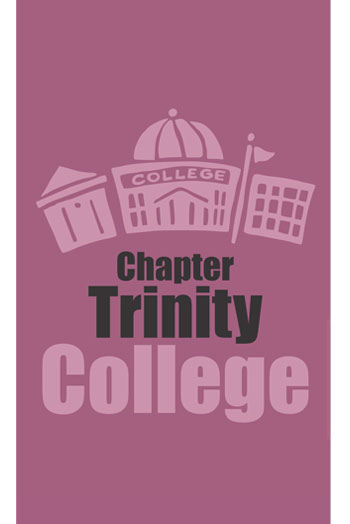
Chapter Trinity College
Trinity College was one of the leading classical schools. Oscar was here from 1871 to 1874. With a scholarship to read classics at Trinity College, Dublin, Oscar found himself surrounded by scholars such as his tutors J.P. Mahaffy (an Irish classicist and polymath scholar) and Robert Yelverton Tyrrell (an Irish classical scholar ), as well as Edward Dowden (an Irish critic and poet) and Arthur Palmer (a politician). These scholars not only inspired him, but also influenced him on his interest in Greek literature. At Trinity, Oscar shared room with his elder brother Willie.
Reverend John Pentland Mahaffy, Oscar’s tutor, was a professor of ancient history. Mahaffy, a distinguished classicist and Egyptologist was also a Doctor of Music, who came across as quite a curmudgeon and a snob; he was heard saying, “I am the best man in Trinity College.” Mahaffy and Oscar were of the same height six-three. The common denominator that got them connect easily was the love for Greek culture. Mahaffy’s works were intensively related to the Greeks. The student-teacher got along so well that its acknowledgement was found in the preface of Social Life in Greece from Homer to Menander (1874) by Mahaffy which read like this:
“To Mr Oscar Wilde of Magdalen College and to another former pupil H.B.Leech for making improvements and corrections to through the book.”
In one of his letters, Oscar calls Mahaffy as his first and best teacher and also the scholar who showed him how to love Greece. Wilde read Mahaffy’s book The Touch of Rome, and learnt about the Roman religion. Mahaffy wrote that the Romans did not have the power of imagination and the power of Greeks to give life to the dry bones of their abstractions; they had no art, no myths. He further opines that the Greeks were modern next door neighbours. When you read Oscar Wilde’s The Critic as Artist you can clearly hear the protégé of Mahaffy speak when he says, “Whatever in fact is modern in our life we owe to the Greeks.”
It was this teacher who had gingerly touched upon the vexed question of Greek homosexuality in his work Social Life in Greece from Homer to Menander (1874). Mahaffy called it an ideal attachment between man and a handsome youth. In fact, he regarded it superior to the love of man and woman. However, in the second edition, Mahaffy chose to drop the part on homosexual love.
Trinity College was a haven for classicalist scholars and thus, Oscar had more than one source to learn more about classicalism. Robert Yelverton Tyrrell, a twenty-five year old Professor of Latin was another influence on Oscar. Tyrrel’s interests were Latin and Greek. He was more jovial than Mahaffy and he never argued with other classicalists. Tyrrell had his own magazine Kottabos, in which he would publish some excellent parodies. Later, Oscar too contributed his translation works and poems to it.
From 1871 to 1874 at Trinity, Oscar established himself as an outstanding student. In his first year, he came first in his class, in his second, he took a competitive examination and won a scholarship, and in his finals, he won the Berkeley Gold Medal, the University’s highest academic award in Greek. These successes encouraged him to compete for a demyship(scholarship) to Magdalen College, Oxford – which was a cake walk, as he had studied Greek for over nine years.
Do you know?
Oscar had pawned the Berkeley Gold Medal for Greek, and later redeemed it.
Here in Trinity, Oscar was already a proponent of aestheticism. It was not difficult for Oscar to become an aesthete after all, the University Philosophical Society of Trinity provided courses in aesthetics. They would have weekly discussion on subjects such as Rossetti and Swinburne. Here, at the Philosophical Society, Oscar presented a paper on Aesthetic Morality.
But what exactly is Aestheticism?
According to Oxford Dictionary of Philosophy:
It’s a doctrine associated with late 19th century writers and artists including Walter Pater, James McNeill Whistler and especially Oscar Wilde. It holds that the appreciation of art and beauty is the highest aim of human life, and especially that the pursuit of such experience is not constrained by ordinary moral considerations.
In short, as Oscar says, it is Art for art’s sake and in lay man’s language, aestheticism is about art that is free of any religious or moral notions.
When Oscar’s career was doing well, Mahaffy claimed that he had created Oscar and taught him the art of conversation. It is said that Mahaffy, like his student Oscar, was a good conversationalist. However, according to Oscar, his teacher lacked style and charm. When Oscar was going through the trials, Mahaffy not only called Oscar, ‘a blot on my tutorship,’ he also refused to sign a petition asking for Oscar’s early release. You know as they say: when you are going through a rough patch your own shadow too will disown you. Apparently, his other teacher, Tyrrell compassionately signed the petition.
With time, Oscar seemed to be accumulating some elements of Oxford behaviour – his Pre-Raphaelite loyalties, his fashionable dressing, his Hellenic interests, his ambiguous sexuality and his contempt for conventional morality. One of the other changes in his behaviour was his growing attraction to Catholicism.
Back then, the Irish lived a cloistral life, as W. B. Yeats (an Irish poet and playwright) would describe it as ‘great hatred little room.’ The Irish society was quite parochial to accept these elements of behaviour. To be a part of Pre-Raphaelite movement was considered to be preposterous; aestheticism, ambiguous sexuality and deviation from conventional morality were not accepted by the society then.
Mahaffy, Oscar’s teacher knew that the study of classics could be done better in England than in Trinity College and Oscar was a brilliant student of classics. But to send Oscar to England, Mahaffy would have to convince Oscar’s father. Sir Oscar agreed to send Oscar to England; however, his reasons were not the same as Mahaffy’s. Oscar’s father agreed to send him to England to cut off his dalliances with Catholicism, for he believed that England would keep his son Protestant.
The almost 20 year old Oscar Wilde presented himself at Magdalen College, Oxford in response to the announcement in the Oxford University Gazette of 17th March, 1874, that Magdalen would award two demyships in classics by examinations on 23rd June. Each of these scholarships paid £95 a year and could be held for five years. One of the other four candidates who were awarded the demyship, G.T. Atkinson recalled that during the examination Oscar kept coming up to the invigilator for more paper because he wrote only four or five words to a line. Adding further, he said that Oscar’s writing was huge and sprawling somewhat like himself; in reality, it was spidery and lingering.
All through the Portora days to Trinity and to Oxford days, the mother and son regularly wrote letters to each other. Oscar Wilde once wrote about his mother, “My mother, who knew life as whole, used often to quote to me Goethe’s lines.”

Chapter Magdalen College, Oxford
In his book De Profundis, Oscar wrote, “The two great turning points in my life were when my father sent me to Oxford and when society sent me to prison.”
In the words of biographer, Richard Ellmann, it was at Oxford that Oscar Wilde “created himself.” Here he found some of the most important influences in Walter Pater (an English essayist, critic of art and literature and writer of fiction), John Addington Symonds (an English poet and literary critic) and John Ruskin (the leading English art critic of the Victorian era, also an art patron, draughtsman, watercolourist, a prominent social thinker and philanthropist).
Among the Irishmen, there is a popular analogy on Oxford, which goes something like this: “Oxford is to mind what Paris is to the body”. On 17th October, 1874, a day after his twentieth birthday, Oscar matriculated before the Rev. J. E. Sewell, Warden of New College and Vice Chancellor. With time you could see Oxford grow on Oscar, he quoted, “My Irish accent was one of the many things I forgot at Oxford.” He also developed a great liking for formal wear, and told a friend, “If I were all alone marooned on a desert island and had my things with me, I should dress for dinner every evening.” When asked about life at Oxford, Oscar lyrically replied saying that it was ‘the most flower-like time’ in his life.
Oscar was never a sports kind of a person. When he was asked at a country house as to which outdoor athletics he preferred, he replied, “I am afraid I play no outdoor games at all.” He would watch cricket though and play dominoes. In his play Vera, a charactersays something very similar to what Oscar told an interviewer, “Exercise! The only possible exercise is to talk, not to walk. It is so exhausting not to talk.”
Prince Leopold, Queen Victoria’s youngest son was among many friends that Oscar made at Oxford. They both shared a fervent interest in Freemasonry(Freemason is a large, old and powerful secret society for men in which all the members help each other and use secret signs to communicate with each other).
In 1870s, Leopold was much in fashion and was Grand Master of the Order. Oscar’s friends Bodley and Williamson were already masons. It is said, that Oscar was lured by the masonry’s dress, secrecy and rituals and thus petitioned the Apollo Masonic Lodge at Oxford. He was received into the Apollo Masonic Lodge by special consideration because he had not yet completed twenty-one. The Masonic costume was quite an impressive one; it had knee breeches, along with tail coat, white tie, silk stockings and pumps. In fact, till date, the Apollo Lodge follows the same dress code.
At Oxford, Oscar read the ‘Greats’ or Literae Humaniores. It was the name given to an undergraduate course that focused on Classics of both Latin and Ancient Greek. However, Oscar did not limit himself to this and also read text of other fields. He read Herbert Spencer and the philosopher of science William Kingdon Clifford. In Swinburne’s Essays and Studies, he learnt the idea of uniting ‘personality’ and ‘perfection.’ Besides Plato and Aristotle, he also read Kant (a German philosopher), Hegel (a German philosopher), Jacobi (a German mathematician), Locke (an English philosopher and physician), Hume (a Scottish philosopher, historian, economist and essayist), Berkeley (an Anglo-Irish philosopher), and Mill (a British philosopher, political economist and civil servant). In modern times, Oscar found Dante (a major Italian poet of the Middle Ages) , Dürer (a German painter, printmaker, engraver, mathematician and theorist from Nuremberg), Keats (an English Romantic poet) and Blake (an English poet, painter, and printmaker) to be the best representatives of Greek spirit. It was in Oxford that Oscar began to keep a Commonplace Book in which he would make entries of range of references.
In Magdalen College, Oscar’s closest friends were his near neighbours William Walsford Ward nicknamed ‘Bouncer’ and Reginald Richard Harding nicknamed ‘Kitten.’ The circle got bigger with inclusion of David Hunter Blair nicknamed ‘Dunskie’. Oscar was nicknamed ‘Hosky’..
Blair in his autobiographical book, points out that Oscar was very polite in his conversations and actions. Also that one of Oscar’s chief interests was the interiors and décor of his house. Of the number of times the duo had been for shopping, once Blair helped Oscar buy two large vases of blue china, probably the Sѐvres, to hold the lilies. It was these blue china vases that inspired him to quote one of the aesthetic statements, “I find it harder and harder everyday to live up to my blue china.”
In an Anglican sermon in the St Mary’s Oxford, Reverend Fr. Dean Burgon interpreted Oscar’s quote saying, “When a young man says not in a polished banter but in sober earnestness that he finds it difficult to live up to the level of his blue china there has crept into these cloistered shades a form of heathenism which it is our bouden duty to fight against and to crush out, if possible.”
Bouncer, Kitten, Hosky and Dunskie would hang out in the evenings and at times these sessions would continue till the sun painted the sky with light. In one of these sessions, Blair and Oscar happened to casually talk about their future and then Bouncer put Oscar in a spot by saying, “You talk a lot about yourself Oscar, and all the things you would like to achieve. But you never say what you are going to do with your life.” It was like he was caught unawares, but he replied Bouncer, “God knows. I won’t be a dried-up Oxford don, anyhow.” That was too brief and unclear a statement; somehow he was not being candid, but as more and more stars got dissolved into the darkness of the night, Oscar went,
“I’ll be a poet, a writer, a dramatist. Somehow or the other, I’ll be famous, and if not famous, notorious. Or perhaps I’ll lead the life of pleasure for a time and then who knows rest and do nothing. What does Plato say is the highest that man can attain here below? – to sit down and contemplate the good. Perhaps that will be the end of me too.”
Hunter Blair reiterated the part rest and doing nothing and said both of these actions are simply not your thing. In fact, Blair added, “You are much more likely to get up and knock about and do all sort of queer things.” Oscar going by the wind that was flying his kite of thoughts replied, “You wait and see my boy. I may begin like that but the end will be very different. These things are on the knees of the gods. What will be, will be.”
We now turn some calendar pages and reach the summer vacation of 1875. Oscar spent first half of it in Italy where he was looking at the paintings which Ruskin, his teacher had talked about. During the visit, Oscar met his old tutor Mahaffy and a young man from Dublin. They went visiting the Basilica di San Miniato al Monte in Florence in mid June, and after that visit Oscar penned the poem San Miniato. In the poem, Oscar exhaled his delight in meta-physical sensation on the one hand and the superficialities of this world on the other. The poem however, was revised for publication in the Dublin University Magazine in March 1876.
Oscar’s writing had this impulse that came largely from his awareness of this tension – much of his work deals with – the sale of souls, the attempt to repurchase them and the states of the negotiator’s minds.
On 19th June, the group went from Florence to Bologna and then to Venice. On 22nd they stopped for a short while in Padua to see the Giottos. The next day they were in Verona and on 25th they started for home. By now, Oscar had already found a subject for his next poem – Rome Unvisited.
For the second half of the vacation Oscar returned home to Ireland. Here, he would travel between Moytura House which had a good view of Lough Corrib, and Illaunroe, the hunting lodge in the middle of a lake. He took the pleasure of rowing, shooting, fishing, riding and sailing. Along came August with a gust of fresh air – Florence Balcombe, the first of the many flowers to bloom in Oscar’s life. She was in Oscar’s word, ‘exquisitely pretty.’ She was seventeen, Oscar was twenty, and they had this wonderful affection for each other. Like any lovey-dovey couple they too had plans of marrying, but then, with time things fizzled out. On another page, Oscar went down on his knees for Fidelia, a young woman in Dublin and on some page flirted with Eva. Among these random manifestations of love, it was Florence who came close to being his official beloved.
The autumn of 1875 marked the beginning of his second year, the time when ‘boy worship’ was getting conspicuous in Oxford. Building of St. Aloysius Church, the first Roman Catholic Church in Oxford since Reformation, was one of the latest developments of that time. Oscar would regularly visit the church to hear Cardinal Manning’s sermons. He found them more secular than spiritual. When he went to meet his friend Bodley, he confessed to him his indecision between Romanism and Atheism. Oscar continued to sway between the two even as he continued to attend Rev Henry James Coleridge’s sermons in St Aloysius.
The wild picture now was: Oscar Wilde’s incipient apostasy and ambiguous relations with men; this came to be known among the Oxonians. Oscar’s fellow demy Atkinson and others noted something effeminate in his swaying walk. The Bodley’s diary too found a mention of something on these lines.
June 1876, Oscar was preparing for fellowship in ‘Classics’ and was worried about the subject ‘Honour Moderations’. Hence, he spent his spring vacation studying in Oxford. It was around this time that he received alarming news from Dublin about his father’s health. Sir William’s health was declining; he had frequent attacks of asthma and was suffering from a painful disease – gout. Right from the beginning of March, Sir Oscar was bedridden and it was finally on 19 April, with his family besides him, that he breathed his last.
Sir William’s will was more of an unpleasant note for he had spent his money as he made it. He would send substantial sum to the mothers of his illegitimate children. As a result, ‘No 1 Merrion Square’ and ‘Moytura House’ were heavily mortgaged. Among his other properties, the ‘Bray houses’ and ‘Illaunroe’ were free and clear. The eldest son Willie got the Merrion House and Lady Wilde got the Moytura. Henry Wilson, the illegitimate son and Oscar jointly got the lodge at Illaunroe. Apparently, the income from the estate was not good enough to live off it. Oscar returned to Oxford with nothing much to bank on financially.
It was now Oscar’s third year at the Oxford 1876-77. This was an important point of time in Oxford as he met the fifty-five year old Slade Professor of Fine Art – Mr John Ruskin, and a fellow of Brasenose College and once Ruskin’s disciple, the thirty-five year old Walter Pater. Oscar had read Pater’s Studies in the History of the Renaissance and was so enthralled by it that he never stopped speaking of it as ‘my golden book.’ In fact, in De Profundis, Oscar described Pater’s work as ‘the book which has had a strange influence over my life.’
Pater, in the ‘Conclusion’ of Studies in the History of the Renaissance declared that life is a drift of momentary acts, we must cultivate each moment to the full, seeking ‘not the fruits of experience, but experience itself.’ Oscar liked the book so much that he learnt tracts of the book by heart and would also carry the book along with him on travels in later years. If it was Pater who gave Oscar the sense of almost flippant devotion to art, then it was Ruskin who gave him a purpose to it.
For Ruskin, morality played a major part in art, whereas for Pater, it was something that could come from intellectual excitement. Oscar here was not only being offered two very different doctrines, but also two different vocabularies. They say beauty lies in the eyes of the beholder. But when you saw it from the eyes of Ruskin it had to be associated with good, and from the eyes of Pater, it might have had a touch of evil. Ruskin spoke of faith, while Pater of mysticism; Ruskin appealed to conscience, Pater to imagination; Ruskin invoked discipline restraint, Pater allowed for pleasant drift.
When Oscar attended Ruskin’s series of eight lectures on The Aesthetic and Mathematic Schools of Art in Florence, he learnt that aesthetics was simply a non-mathematical element of painting. Ruskin could never agree to self-justified amoral art that people like Pater promoted. For Ruskin, the importance of art, lay in its potential for the betterment of society. He did not like the idea of art for mere amusements or as he (Ruskin) would say, ‘ticklers and fanners of soul’s sleep.’ However, Pater believed that the aesthetic sensibility of the man must be cultivated before all things and special emphasis must be given to experience.
In De Profundis, Oscar talked about the ‘strange influence’ that Pater’s work had on his life. After all, though Ruskin developed in him the sense of dedication to art, it was with Pater, that he found his aesthetic inclinations take shape strongly.
By now Oscar was comfortable with the Oxford lifestyle. He was doing well in his studies and the only thing that was worrying him was his soul. Roman Catholicism attracted him more than ever before. Apparently, he had more than one reason to feel this way: his powerful influences, Ruskin and Pater and their Roman Catholicism connect. Ruskin had spent the summer before he met Oscar in a monastic cell at Assisi. He got converted as he felt more Catholic than Roman Catholic. Pater on the other hand, would visit Roman Catholic churches to admire their rituals and décor and would praise their aesthetic charm. Oscar’s friend, Hunter Blair, on their trip to Rome got himself converted into Roman Catholicism.
The six-week Easter term took off on the 4th of April, 1877. Oscar had applied for a ten days leave and did not back until the 26th. This effrontery did not go down well with the Magdalen officers and they did not allow him to sit for the term. This was just one part of the punishment. The second part was that he was deprived of emoluments of his demyship for the half-year ending Michaelmas (the first academic term of the academic year in English-speaking universities and schools, especially in the United Kingdom) in 1877. The Magdalen officers had to say, ‘fine we consider that you are studying Classic, but that’s not an excuse to Olympia.’ To beat this injustice of rustication, Oscar chose to go to London to his friend Frank Miles’ place. During his stay in London he got his first prose work The Grosvenor Gallery published in the Dublin University Magazine.
With only a year gone by, the angel of death came knocking on 13th June, 1877. This time it was Oscar’s half-brother Henry Wilson. This left Oscar and Willie to be the sole heirs but what Oscar got was just £100 and the joint ownership of Illaunroe with Willie; that too, on a condition: only if he remains a Protestant.
June 1878, time to take school examination. Oscar knew that this examination was important as it would determine the class of his degree. As his father had not left much to depend on financially, Oscar soon began to face financial problems. The academic year 1877-1878 began on an impoverish note, for when Oscar failed to submit the required assignment to his tutor, the college did not waiver the remission of half his fine. It took a lot of persuasion to have the officers consider his case.
Oscar was never known to be thrifty and he continued to overspend even after the death of his father. In the letter he wrote to his mother he said that he had given up all hopes of a college fellowship because even if he got elected, he had no funds to afford it. He started looking out for some work. Lady Wilde could not see her son wallow in hopelessness and therefore, she suggested that he sell the Bray houses and meet all the expenses. The sale of Bray houses did get in some dough but it could not stop Oscar from living in debts. On two accounts he suffered the Oxford indignity, he had to face the Vice Chancellor’s Court to settle his pending dues.
One thing which Oscar Wilde was clear about was the ‘POWER OF NOW’. He would not allow anything to interfere with present enjoyment. Money or no money, he would dress magnificently – cello coats and super fancy Angola suits. He loved to dazzle. In fact, he would also keep the décor of his room classy. His room was furnished with talismanic lily, exquisite objects, Tangra statuettes, Greek rugs, photographs of his favourite paintings and his famous easel carrying an unfinished painting. He had an interesting explanation to his easel carrying an unfinished painting:
“Some artists feel their passion too intense to be expressed in the simplicity of language, and find in crimson and gold a mode of speech more congenial because not quite so translucent.”
Soren Kierkegaard, a Danish philosopher, theologian, poet and social critic in his published work ‘Either/Or’ very interestingly anatomizes aesthetic man.
He says:
“Unlike ethical man , an aesthetic man is so caught up in succession of moods.. to each of which he surrenders wholly, that he loses touch with the personality he wished to express.”
Oscar had not read Kierkegaard’s work but kept constant updates on the assaults on aestheticism by reading William Hurrell Mallock’s The New Republic. Enclosing a photograph of Burne-Jones’ water colour Spes in a letter to a young woman, Oscar wrote, “In so many of Burnes-Jones’ pictures, we have merely the pagan worship of beauty: but in this one I seem to see more humanity and sympathy than in all the others.”
Oscar in his last year in Oxford, wrote two poems ‘The Sphinx’ and ‘Ravenna.’ In these poems he strongly brought about the humanity and sympathy element. For his poem Ravenna, Oscar won the Newdigate Prize. It was a prize awarded to Oxonian for best composition in English verse by an undergraduate.
Things happen and then things happen. In Oscar’s case he contracted syphilis, which according to him was from a woman prostitute. This one episode completely shook him. What did the doctors have to say? Well, anyone who has contracted this disease has to wait for two years before marrying and undergo course of mercury treatment. One thing is for certain, the side effects of mercury treatment were not pleasing. You could have a protrusive teeth go black. Hence, during the course of treatment Oscar would cover his mouth with his hand while talking. The physical side effect was one thing, but mentally, he now began going into fits of melancholy.
April 1878, the 24 year old Oscar was down with this dreadful sickness and he began to mull over his decision of embracing Catholicism. Oscar came in contact with Reverend Sebastian Bowden, a name known for conversions among the elites. In fact, there were rumours that Oscar was about to join the Roman Catholic, but that remained to only rumours.
In June, Oscar took the examination for Final Schools. Future scholar, Horton, observed during the examinations that after the first hour of the exam Oscar walked up to the desk for fresh paper and handed over the answer booklet even before the time was up. He was amazed by such intelligence and confidence.
Oscar in his ‘Commonplace’ book would enter questions that got him thinking. One of them was:
“If Philosophy aims at some good to man it comes too late in the day for that: for while religions preside over the birth of nations, philosophy often follows them to their grave. It is not till the twilight comes that the owl of Athena begins its flight.”
The Final Schools results were out. Oscar not only passed it with high marks but was also awarded a ‘rare double first’. Since he had yet to pass the Divinity examinations, without which he could not take his degree, his demyship was extended for a fifth year.
By stirring his conscience with Ruskin and his sense with Pater, Oscar was more like a Long Island Ice Tea on the Oxford menu. He was becoming a blend of Catholicism, Freemasonry, Aestheticism and various other doctrines. The interesting thing is that he embraced them fervently but temporarily. His paradoxes were always about what lay behind the accepted or conventional. For he’d say, “A truth in art is that whose contradictory is also true.” In his essay, Truth of Masks, he tells that his immersion in various movements taught him first about art, then about life.
July 1878, little before Oscar was returning to Oxford, his vacation ended with the news that Florence Balcombe had accepted the proposal of marriage from Bram Stoker. Stoker who was seven years older than Oscar was an enterprising Irish civil servant and drama critic. Considering that he agreed to become the business manager of Lyceum Theatre and the twenty year old Florence had aspirations to become an actress, she cut herself a good deal. Oscar on the other hand was almost close to getting his degree and was to go into hibernation to overcome syphilis.
After settling the sale of Bray houses, Oscar left Ireland for good. In a letter to Florence, he asked her to return the gold cross which he had gifted her two years before. The cross had their names conjoined. Obviously, she would now no more wear it; he wrote to her that he would keep it as a souvenir of ‘the sweetest of all years of my youth.’ Love like this never fades, but spreads across the rest of your life. Three years later, he sent her a crown of flowers anonymously for her stage début.
On November 22, Oscar passed his Divinity examination and six days later took a degree of Bachelor of Arts. With this ended the chapter of Oxford in the books of Oscar Wilde. He applied to join the Oxford Union but failed to be elected.

Chapter Post Oxford Life
With £ 2,800 in hand after selling Bray houses, in December 1878, Oscar moved to London with his friend Frank Miles. Here he refreshed his friendship with Lillie Langtry whom he compared to Helen of Troy and said, ‘Yes it was for such ladies that Troy was destroyed, and well might Troy be destroyed for such a woman.’ Oscar had met Mrs Langtry, the wife of an Irish yachtsman at a party three years ago. Fascinated by her beauty, he wrote the poem The New Helen. But as they say not all beauties are eternal, the ones like these with time fade.
In the early 1879, he and Miles found a place at 13 Salisbury Street off the Strand. Oscar described it as ‘untidy and romantic’; it had old twisting staircases and dimly lit corridors. It had this Dickensian eccentricity to it. Oscar named the place Thames House as his window had the river view. They stayed here for a short time, and after moving places, they finally settled at 146 Oakley Street, Chelsea.
Late 1870s began to see attacks on aestheticism; playwrights came up with parodies and others with caricatures. The play ‘The Grasshopper’ thatopened at Grosvenor Gallery was a dance of three persons imposing as Oscar and his friends Whistler and Miles. James Abbott McNeill Whistler was an American-born, British-based artist and Miles was a London architect and artist who specialized in pastel portraits of society ladies. Both were prominent proponents of aestheticism. Gilbert and Sullivan’s opera Patience, a great hit, was a satire on aesthetic movement, a movement that emphasised on aesthetic values over moral or social themes. The movement was so popular that it was easy to ridicule aestheticism as a meaningless fad. Oscar, in reply to the anti-aestheticism said, “Notoriety is fame’s wicked twin.”
It had been seven months since the play Vera was in circulation now. Oscar got busy working on getting his collection of poems published. He compiled them in to his offering ‘Poems’. In June-July of 1881, he presented a copy of the book to writers for seeking approval. Reviewers from Athenaeum, Saturday Review and Spectator did not have much to say. But the Oxford Union came on strongly, alleging it to be plagiarised.
The rehearsals for the stage performance of Vera were about to begin and Oscar was already set to write another play. He told the magazine Biograph, thathe intended to write five-act tragedy in blank verse. At first, it was to be titled The Duchess of Florence, but later as it was relocated, it was titled The Duchess of Pauda. While he was waiting for Mrs. Bernard Beere to begin the rehearsal for Vera, Oscar received a cablegram from an English Impresario Richard D’Oyly Carte in New York. Carte, the producer was running Gilbert and Sullivan’s opera Patience in New York which was a big hit here as it was in London.
The whole anti-aestheticism play generated more and more interest in the movement. Richard D’Oyly Carte asked Oscar if he could come to America and tell people about aestheticism. For the only traces of aestheticism that reached America were women’s gowns hung from the shoulders in flowing folds, Queen Anne furniture, Morris wallpaper and Japanese screens. Carte thought of a way to make Patience even bigger. To take it further, he came up with the idea to have a program wherein Oscar would give lectures on aestheticism which would in return give boost to the popularity of Patience. And Patience would boost the popularity of Oscar’s lectures on aestheticism.
In America, there was not much of source to learn more about the movement. They did not have direct information on the movement and all that they learnt was through parody and mockery. Thus, there was this urge to learn what aestheticism was all about and who better than the greatest proponent of the movement – Mr Oscar Wilde, who could answer the queries on aestheticism. The very next day, Oscar cabled Carte a positive reply and everything was arranged. According to the deal, Oscar’s expenses would be taken care of and the net profit would be shared equally.
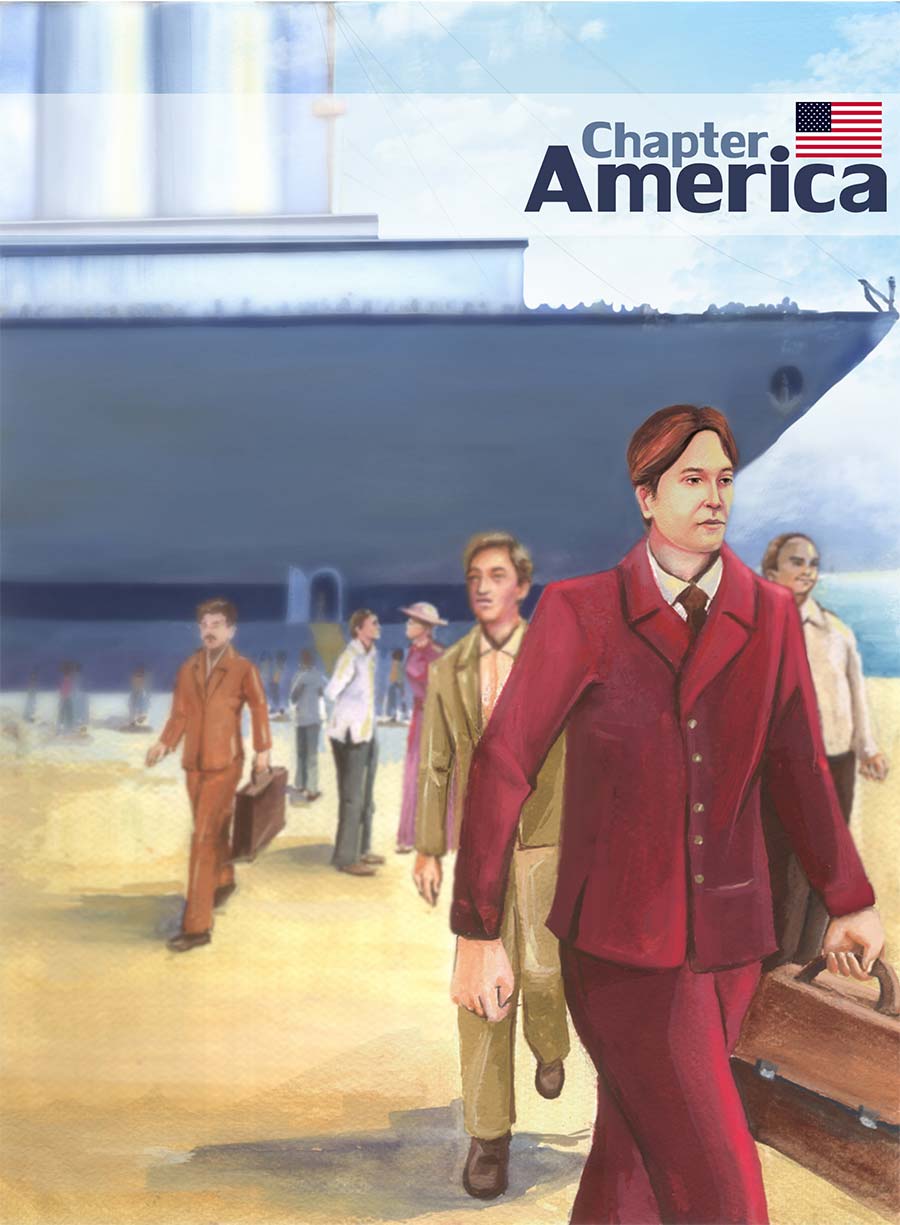
Chapter America
[Ship horn honks] SS Arizona British passenger liner docked in New York harbour on the evening of 2nd January, 1882. When one of reporters asked, what was this aestheticism that he has come to promulgate about? Oscar laughed and braved to say, “Aestheticism is a search after the signs of the beautiful through which men seek the correlation of the arts. It is to speak more exactly, the search after the secret of life.”
Oscar and his wittiness wherever they went, they went together. When the customs officer questioned Oscar, “Do you have anything to declare?” Oscar replied, “I have nothing to declare except my genius.” Apparently, in days to come his genius was soon to be made known.
What was supposed to be a four months stay in United States was stretched out to nine months. At his lectures, Oscar won the audience by his ostentation. His costume was one of the many things talked about: the knee breeches showing off the well-shaped legs and low shoes with bright buckles. During his stay in America, when he was not busy giving lectures, he was busy attending parties, luncheons and plays. It was planned that he would lecture only until April, but due to immense popularity, he had bookings across the country. Oscar conducted lectures in central and eastern Canada, to South America, Rhode Island, New York and New Jersey. His schedule was so packed that he had six lectures a week. By now, he was the talk of the town. The fact that the pirated copy of his book Poems were sold at ten cents and popular songs were published with titles such as ‘Oscar Wilde Forget-Me-Not Waltzes’, ‘The Flippity Flop Young Man’ and ‘Oscar Dear’ goes to show that Oscar was warmly accepted by the Americans. During this stay, Oscar was mercilessly criticised and mocked in the press. For instance, the Springfield Republican commented on Oscar’s behaviour during his visit to Boston to lecture on aestheticism, “more of a bid for notoriety rather than a devotion to beauty and the aesthetic.”
When Oscar left America in the last week of December, Tribune claimed to quote him that his American tour was a failure. As far as Oscar was concerned NO WAY; it was not a failure! What do you say when you become popular in two of the globe’s largest nations – America and Canada. However, the poets of that time felt that Oscar lacked style, not that he had a style then, but the visit to America made things clear for him. When he was in Omaha, he was asked about his future plans to which he replied, “Well, I’m a very ambitious young man. I want to do everything in the world. I cannot conceive of anything that I do not want to do. I want to write a great deal more poetry. I want to study painting more than I’ve been able to. I want to write a great many more plays, and I want to make this artistic movement the basis for a new civilization.”

Chapter Paris
Oscar returned to London in excellent spirits. However, he was not keen to settle in London as of now. He wanted to go someplace else and complete The Duchess of Padua. A place whose language was known to him, so Paris – reason: French literature was like his second mother tongue. The end of January 1883 opened to a small chapter Oscar Wilde’s visit to Paris. In the heaven of art lovers, Oscar met a young English man Robert Harborough Sherard who helped him settle down in the city. For the records: Sherard was the great grandson of the poet William Wordsworth and he was to become Oscar’s biographer. During the visit, Oscar was financially doing well and because he had always been generous and pompous in his ways of living, they would visit elegant restaurants.
In one of the instances, while Oscar was talking of his lectures on beauty in America and was insisting that beauty might be found in the commonest thing, Sherard for some reason was not convinced. He dipped his cigar butt into the coffee in his saucer and said, “Do you see any beauty in this?” Oscar in an undisturbed voice replied, “Oh, yes, it makes quite an effective brown,” and sensing that Sherard was mocking him, he desisted from further elaboration.
‘The Duchess of Padua’ was not completed as per the contract’s stipulated time 1st March, 1883, but almost 15 days later. The Parisian visit got even better when Oscar got to dine with Victor Hugo (a French poet, novelist and dramatist). In an event organised by the painter Giuseppe De Nitts, Oscar met some of the known Impressionists like Edgar Degas and Camille Pissarro. Marcel Proust and Maurice Rollinat were the other celebrated artists he met. After three months in Paris, Oscar realized one thing for sure, in Paris he did not receive similar response to his heralds of decadence as he did in America. Reason: Parisian decadence was a pretence riding on the edges of absurdity. Oscar was now running out of his American income so by mid-May Oscar returned to London.
Around August, Oscar was running low on the finance front. He got in touch with Colonel Morse and asked him to arrange a lecture tour of British Isles. Apparently, the salary was not all that good, but then, he desperately needed money, be it a minuscule amount only. He offered two lectures, ‘Personal Impressions of America’ and ‘The Hose Beautiful’ at Prince’s Hall, Piccadilly. The lecture on ‘Impressions of America’ was a mix bag of comments on scenery, people, art and theatre done in an Oscarly witty fashion. Oscar’s lectures on “Fashion”, “Values of Art in Modern Life” and “Impressions of America” were well received and spoken about in the art and literary circle.

Chapter Marriage
Constance Lloyd, born on 2nd January, 1858, was three years younger than Oscar. This five feet eight inches tall beautiful woman was the daughter of Horace Lloyd, a wealthy Queen’s Counsel. She had long wavy chestnut coloured hair, great eyes and a well-shaped body. Oscar met her in Dublin, where he was giving a lecture as a part of his lecture circuit in Ireland and England; Constance happened to be visiting Dublin at the same time. Now back to Constance Lloyd, some of her interests were music, painting and embroidery. She could read the works of the famous Italian poet Dante and that too in the original language-Italian. She was logical, had a mathematical mind, was shy, and yet loved talking.
In the initial stage, the understanding was slow between Constance and Oscar. Constance had attended an art school and thus had an aesthetic style of dressing. The couple and their families met each other for some time. When Oscar returned from Paris after the courtship, the couple got engaged on 26th November, 1883, and a year later married on 29th May, 1884, at St. James Church. The couple left for Paris for honeymoon by the first week of June, they were put up at Hotel Wagram.
One of the outings during the honeymoon was to the Salon to see Whistler’s paintings. They also visited an exhibition of Meissonnier, the famous French goldsmith, sculptor, architect, furniture designer and painter. They saw a light opera called Lili and watched Sarah Bernhardt’s play. Apparently, some friends in Paris dropped by to visit them Paul Bourget, Vernon Lee (pen name Violet Paget), Chicago sculptor John Donoghue, John Singer Sarget and Henrietta Reubell, a wealthy American and a friend of Henry James.
The highlight of the honeymoon days was the interview that Oscar gave to a reporter of Morning News. It was not about any event or anything but the book – “A Rebours” written by Joris-Karl Huymans. Oscar was enthralled by the book. It was to him in eighties, what Pater’s Studies in the History of the Renaissance was in seventies. He said to the Morning News, “This last book of Huysmans is one of the best I have ever seen.”
In 1885, Mr. and Mrs. Oscar settled down in a house on Tite Street, Chelsea, London. A good amount of money was spent to get a plush house done to live up to the status of the champion of aestheticism. The entire renovation was entrusted to the architect Edward William Godwin, one of the finest architects of that time. The newly done up space made way for the new member of the family. The couple had their first bundle of joy delivered in June, and they named him Cyril Oscar. A year later, the couple was blessed with another son whom they named Vvyan.

The Whistler Episode
Like Oscar, James Whistler was also a leading proponent of the credo, “Art for art’s sake.” Once upon a time a friend of Oscar’s, and a painter by profession, he was averse to sentimentality and moral elements in paintings. Relation between the two was good only during the first ten years between them and with time things started getting sour. Whistler would get more aggressive and thus would merge to have an upper edge.
On one hand Oscar was busy with his lectures, while on the other, Whistler was working on an anti-Oscar move. With the help of Archibald Forbes, one of Oscar’s old enemies, Whistler got introduced to Richard D’Oyly Carte and the latter arranged lectures for him in the Prince Hall. Whistler scheduled them at an unknown time of ten o’clock on the evening of 20th February, 1885. In these lectures which later came to be known as “Mr Whistler’s Ten o’clock”, it was more about scoffing and mocking Oscar and Whistler did it without naming him. Now the ball was in Oscar’s court. He retorted with two articles in the Pall Mall Gazette cheekily taunting Whistler about his five feet four inches stature. In response to the snubs that Whistler made on humanity and nature, Oscar said, “the arts are made for life and not life for arts” and “To encourage people to ignore the environment – the vulgar objects in their room, or the unattractive clothes they felt obliged to wear – was to encourage ugliness.”

Chapter Oscar's Works
Between 1886 and 1888, Oscar wrote a series of about hundred reviews. However, after writing so many reviews he gradually stopped writing them as well as giving lectures. Now as they say, good work never goes unnoticed, Oscar’s reviews caught the attention of the famous Italian playwright George Bernard Shaw. He spoke highly about Oscar’s journalistic skills, so much so, that when Thomas Wemyss Reid, the editor of Leeds Mercury newspaper came to London in February 1887, he thought to put Oscar’s talent to use. The publishing company had started a magazine The Lady’s World: A Magazine of Fashion and Society, Reid asked Oscar to check out the previous issues of the magazine and come up with ideas for improvement. Oscar made some suggestions that were soon incorporated and the title of the magazine was changed to The Woman’s World.
Besides writing poems, plays and reviews, Oscar also wrote essays and stories. The story book The Happy Prince and Other Tales, published in May 1888, was a collection of stories for children. It contained five stories and the most famous among them is the title story “The Happy Prince.” The publication of the book added a dimension of story writer to Oscar Wilde’s repertoire. Oscar, in his stories, celebrated the power of love as greater than the power of evil or the power of good.
By December 1888, Oscar completed his second essay “Pen, Pencil and Poison”, first being “The Truth of Mask” (1885). These essays along with The Critic as Artist and The Decay of Lying were published as Intentions in 1891. Before compiling them under one title the Intentions, the dialogues on aesthetic subjects were revised and then published. The period between 1889 and 1895 were the peak times in the life of Oscar Wilde. These were also the years in which aestheticism was revised and perfected.
In 1891, he wrote two stories The Portrait of Mr W. H. and The House of Pomegranate. It is said, that Oscar got the impulse to write The Portrait of Mr W. H. while in conversion with his ‘beloved disciple’ Robert Ross. The story is about endeavours to uncover the identity of Mr W.H.; the plot is about unveiling one Willie Hughes which according to the theory of Thomas Tyrwhitt is the one who is the dedicatee of Shakespeare’s Sonnets. The House of Pomegranate was a collection of fairy tales, which was published in the second edition of The Happy Prince and Other Tales.
During the 80s, though Oscar was not that bold about aestheticism, yet, he was scorned or scoffed at. The 90s saw a bolder Oscar who did not surrender his contempt for morality or nature for which he was rebuked or laughed at. Oscar would now talk about ‘higher ethics’ in which artistic freedom and full expression of personality were possible along with curious brand of individualistic sympathy or narcissistic socialism.
The Picture of Dorian Gray was a lead story that was published on 20th June, 1890, in the Lippincott’s Monthly Magazine. The story kicked up a storm in the Victorian society. What else do you expect when you have a play with homoerotic concept with a Victorian backdrop? This was utter blasphemy and an unacceptable faux pas. Reviewers at The Daily Chronicle called it “unclean”, “poisonous” and “heavy with the mephitic odours of moral and spiritual putrefaction.” After all that was said and done, Oscar made several alterations to it, added new chapters, expanded the story and published it as a novel in April 1891.
The new form of aestheticism modified the relationship between the reader and the writer. In fact, many young men and women learnt of the existence of uncelebrated forms of love through the hints in The Picture of Dorian Gray. To put it in the words of an aesthetic follower, “the aestheticism in Eighties lacked an example but Dorian Gray filled it.” In a reply to the editor of the Scots Observer, Oscar clarified his stance on ethics and aesthetics in art, saying “If a work of art is rich and vital and complete those who have artistic instincts will see its beauty and those to whom ethics appeal more strongly will see its moral lesson.”
Soon after the Christmas of 1891, Oscar went with his brother Willie to Torquay, a seaside town in the Devon County, England. He was here until January, finishing his plays: Salome and Lady Windermere’s Fan. The interesting part about these plays was that one was about a bad woman and the other about a good. Lady Windermere’s Fan play was about a good woman and Salome about a bad.
Lady Windermere’s Fan was first published in 1883. It mordantly satirized the morals of Victorian society, especially marriage. The plot was: a woman doubts her husband of having an extramarital affair – confronts her husband – he instead invites the “other woman” to the party – the doubting woman plays tit-for-tat and elopes with another man – the plot thickens when the other woman persuades the lady to get back to her man – the other woman is none other than the lady’s very own mother who had abandoned the family twenty years ago.
Oscar here tried to highlight that Puritanism, like debauchery, can be equally bad. In simple words, sometimes too much of good can be bad. Thoughtless goodness is as self-destructive as evil and becomes what it despises. The play was first performed on 20th February, 1892, at St. James Theatre in London. The play became quite popular; in fact, they were now touring all over the country. The success of this play led to Oscar’s A Woman of No Importance in 1893 and An Ideal Husband. These plays brought out the comedies of the Victorian Society.
Salome was originally written in French and later translated into English by Oscar’s lover Lord Alfred Douglas. Published in the year 1893, the play tells of the Biblical story of Salome in one act. Salome, the stepdaughter of the tetrarch Herod Antipas, disappoints her father by asking for Jokanaan that is John the Baptist’s head on the silver platter for dancing the dance of the seven hills. The plot sounds interesting but the play was banned as it was illegal to depict Biblical characters on the stage. However, by February 1896, the waves of ban ebbed away and the play was eventually performed on 11th February, 1896.
What a silly thing love is! It is not half as useful as logic, for it does not prove anything and it is always telling one things that are not going to happen, and making one believe things that are not true.
- The Nightingale and the Rose

Chapter Douglas
Lord Alfred Bruce Douglas, nicknamed Bosie, was only twenty-one when he was introduced to Oscar Wilde by a common friend Lionel Johnson in mid-1891. He was a young undergraduate at Oxford. In the blame game, Douglas accused Oscar to have laid siege to him and say after about six months, won him. But you cannot blame Oscar, it was his nature to woo his prospects and flatter them. Everything was fine between the two until the spring of 1892, when Douglas asked for Oscar’s help.
There was someone at Oxford blackmailing Douglas over an indiscreet letter. Oscar the superman came to the rescue, went to Oxford and stayed for a weekend in Douglas’ room. During his stay, he pulled some threads, got his friends cum solicitor George Lewis into the matter and settled it by paying £100 to the blackmailer. Now this may sound a bit tacky but cannot help it.
After Oscar rescued Bosie from that blackmailer, it was Meet the Parents scene. Bosie introduced Oscar to his mother, Lady Queensberry, the name sounds something royal and elite, right? Right! Bosie was the third son of Mr & Mrs John Douglas, the 9th Marquess of Queensberry, like a typical mother, told Oscar about her son’s vanity and extravagant habits, and also requested him to advice and help her son whenever required.
Like any love story, the beginning of this love story was lovey-dovey and rosy-cozy. And what do you expect when the lovers are poets? Oscar and Douglas would write and exchange poems between each other. In Douglas’ poem ‘The Two Loves’ there is this line: “I am the love that dare not speak its name.” The poems of ‘the young Domitian’ (that’s what Oscar fondly called Douglas) expressed the feelings of concealed homosexuality and mixed disclosure. However, after many moons reality began to seep in and Oscar realized that Douglas was irresponsible and unmanageable. He would be very charming and brilliant at times but would throw temper tantrums and drive you crazy the very next moment. In an instance when Douglas was threatened by his father that his allowance would be cut off, he began to stay with Oscar. In such times Oscar was financially well off, his plays were doing pretty well and in addition to that he also had income coming from his jobs as an editor at The Woman’s World. The couple thus could indulge in every whim, whether material, artistic or sexual.
Douglas introduced Oscar to the Victorian underground gay prostitution. Through a friend, Douglas came in touch with Alfred Taylor who later introduced Oscar to a series of young, working class, male prostitutes. The English Society tolerated homosexuality as long as one was not caught. Oscar also had casual associations with Ross and John Gray besides Douglas and other young boys. All this made the chances of Oscar getting caught pretty high but fortunately, he was lucky.
One morning in the Savoy Hotel room, Constance Wilde dropped by to bring Oscar his post and she saw him and Douglas sharing a double bed. When she asked Oscar to come home, he pretended that he could not remember the room number as it had been long since he had been home. At this occasion when he was explaining about another “friend” of his, ‘Pierre Louÿs’, he said, “I’ve made three marriages in my life, one with a woman and two with men.” The two men here presumably could be Douglas and one between Gray and Ross.
Douglas skipped the Greats examinations that took place in June 1893. He got his name off the college books and displayed his arrogance indignantly by writing to the President that someday this would be the greatest disgrace for Oxford. Oscar praised Douglas’ decision and congratulated him on having followed Swinburne’s example of remaining permanently an undergraduate. Now that Oxford was behind him, Douglas was free to devote life to its pleasures. Having nothing to do, Douglas stuck around Oscar and thought he could help him with translation or any other work. But during the course of translation, quarrel became more of a regular thing and there were exchange of violent letters between the two.

Chapter Queensberry
During the year 1894, homosexuals were everywhere. The Marquess of Queensberry’s eldest son, Drumlanrig, was private secretary to Lord Rosebery, the then Foreign Minister. Somehow, Queensberry suspected that Rosebery was influencing his son. An outspoken atheist known for his brutish manner could not take this and he ran after Rosebery’s life. His second son too did not give him a reason to be happy; he married a clergyman’s daughter who according to him was not up to their standard.
When it came to Douglas, Queensberry confronted Oscar and Lord Alfred about the nature of their relationship several times, but Oscar was always able to pacify him. In June 1894, like any headstrong dad, Queensberry barged in to Oscar’s residence without any appointment and yelled “I do not say that you are it, but you look it, and pose at it, which is just as bad. And if I catch you and my son again in any public restaurant I will thrash you.”
Queensberry was not done yet. In 1895, Oscar’s play The Importance of Being Earnest was first performed on the 14th of February at St. James’s Theatre. The plot was about protagonists maintaining fictitious personae in order to evade burdensome social obligations. The play received great reviews; the audience liked its humour, high farce and witty dialogues. The play had a successful opening night but the result of ‘not being earnest’ was waiting round the corner. It is said that Queensberry was all set to present Oscar with a bouquet of rotten vegetables and create havoc. He wanted to go public and expose the so-called popular playwright.
The Scene: Oscar v. Queensberry
Act One:
(The act that provoked Oscar to sue Marquess of Queensberry)
The Marquess of Queensberry on 18th February, 1895, left his calling card at Oscar’s club the Albemarle.
On it, these words were inscribed: “For Oscar Wilde, posing SODOMITE [sic]”
How dare can someone just walk in to your club and drop a card that disparages your image!
Act Two:
Oscar could not take this insult, against his friends’ advice, he sued Bosie’s father for libel accusing him of homosexuality. Apparently, according to the Libel Act of 1843, if you are charged criminal libel, once proved, the verdict would be a possible sentence of up to two years imprisonment.
Now only if Marquess proved that his statement “posing as a Sodomite” was true in substance, then the whole episode would have a reverse effect and instead of Marquess getting punished, Oscar Wilde would be behind the bars.
Final Act:
In due course of the case, Oscar in discussion with his lawyers, understood the ramifications and thus withdrew the case. In order to avert the disaster of finding himself in prison, Oscar not only withdrew the case, but also agreed to pay Queensberry a considerable amount for the legal expenses he incurred in the process of defence. The entire episode left Oscar bankrupt.

Chapter Imprisonment
Sigh! But that was not all; the worst was yet to come. Under Section 11 of the Criminal Law Amendment Act 1885 Oscar was arrested for “gross indecency” a term meaning homosexual acts not amounting to buggery (an offence under a separate statute). The events around the case moved quickly, the final trial was presided over by Mr. Justice Wills. And finally, on 25th May, 1895, Oscar and Alfred Taylor were convicted of gross indecency and sentenced to two years’ hard labour.
Oscar had always lived a comfortable life and two years of hard labour was the harshest thing to happen to him. Hard labour wore him down physically and his health declined sharply. In fact, his right ear drum was ruptured when he collapsed in the chapel. This rupture later contributed to his death. During Oscar’s imprisonment at Reading Gaol in London, his mother was not allowed to see her son. Later, in January 1896, she died due to bronchitis. Oscar’s wife, Constance, left for Switzerland along with her children and took her maiden name, Holland.
While in prison, Oscar spent a lot of time on reading and writing. He wrote letters to Douglas which he was not allowed to post. The privilege of reading and writing was given to Oscar only after fourteen months of hard labour. The letters were Oscar’s introspections of his career to date. The first half closed with Oscar forgiving Douglas, more for his own sake than Douglas’. The second half was more about Oscar’s spiritual journey of redemptions and fulfilment through his prison reading. The entire episode of imprisonment filled his soul with the fruits of experience; it may have tasted bitter though, but it gave his life the profundity that was missing all the while. These letters were finally published under the title De Profundis.
In May 1897, after his release, a feeble, penniless and disgraced Oscar moved to France. He took the name Sebastian Melmoth and led the rest of his life in this voluntary exile. The two years in prison made Oscar spiritually strong. In fact, he wrote to the Society of Jesus requesting for a six-moth retreat, which unfortunately was not obliged.
The conditions of the English prisons were real bad during those times and this left an inedible impression on Oscar’s mind. In his letters to the Daily Chronicles, he described the inhumane conditions of the prisons in England and pled for reform. That was not it, in his next masterpiece, The Ballad of Reading Gaol, the poem took a detour from narrating the execution of a man who murders his wife for her infidelity to symbolic identification of incarcerated souls. Oscar wrote the poem during his stay with Robert Ross in Berneval-le-Grand in, northern France.
It is not that after his release Oscar did not meet his love Douglas, they did meet and lived together for short time in Naples, but were separated by their families with the threat of cutting their funds. Constance did not turn back or met Oscar, but she would send him some allowances. Deteriorating health of Oscar finally spelled cerebral meningitis on the records. In his last days, some of his “friends” who were around him were Robert Ross and Reggie Turner. Robert Ross arranged for a Catholic priest and got Oscar converted to Catholicism. Finally, on 30th November, 1900, the entire act of the great playwright came to an end.
The funeral was held on 3rd December, 1900, a requiem mass was said by Father Culthbert before the great playwright’s coffin was brought to Bagneux cemetery in Paris. His grave was marked with a Latin quotation from Book of Job, which in English read as, “To my words they durst add nothing, and my speech dropped upon them.”
It is said, that within the prison walls, Oscar would spell his feelings on paper, and in one of those papers he wrote:
“When first I was put into prison some people advised me to try and forget who I was. It was ruinous advice. It is only by realizing what I am that I have found comfort of any kind. Now I am advised by others to try on my release to forget that I have ever been in a prison at all. I know that would be equally fatal. It would mean that I would always be haunted by an intolerable sense of disgrace, and those things that are meant for me as much as for anybody else – the beauty of the sun and moon, the pageant of the seasons, the music of daybreak and the silence of great nights, the rain falling through the leaves, or the dew creeping over the grass and making it silver – would all be tainted for me, and lose their healing power, and their power of communicating joy. To regret one’s own experiences is to arrest one’s own development. To deny one’s own experiences is to put a lie into the lips of one’s own life. It is no less than a denial of the soul.”
This piece of his heart was an extract from De Profundis.
Well, that was Oscar Wilde the poet, the writer and the artist whose Art was for art’s sake.
Oscar Wilde valued his two years imprisonment more than anything else in his life, for it taught him what books would not. So, something on the lines of Robert Browning Hamilton’s poem Along the Road, we close the chapter – Oscar Wilde and continue to enjoy reading his works and spread the good word.
Next Biography





